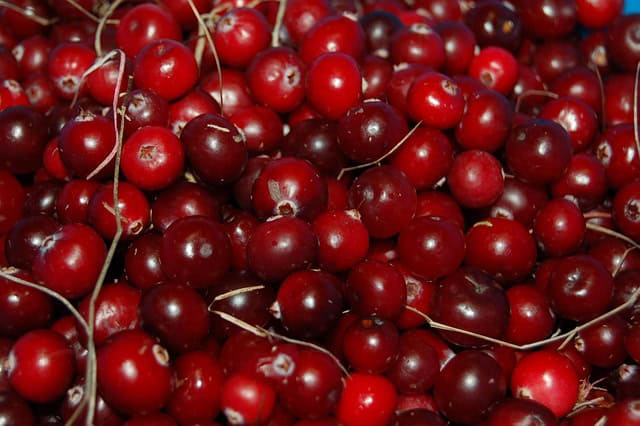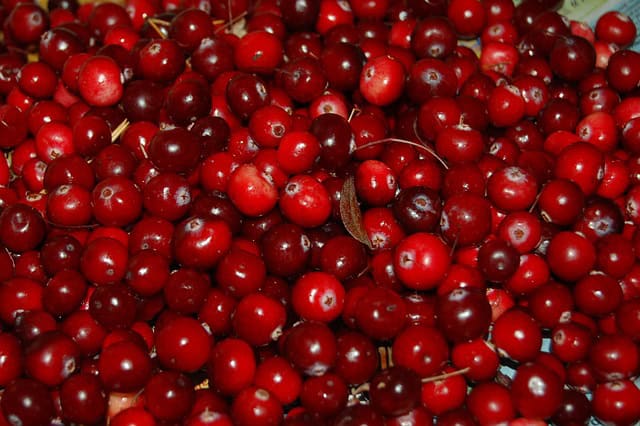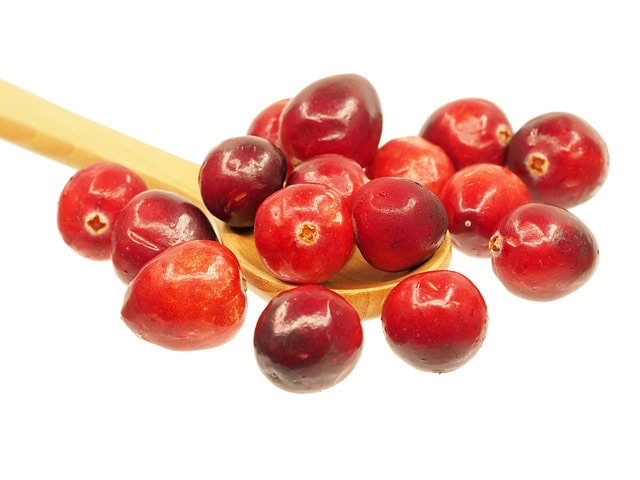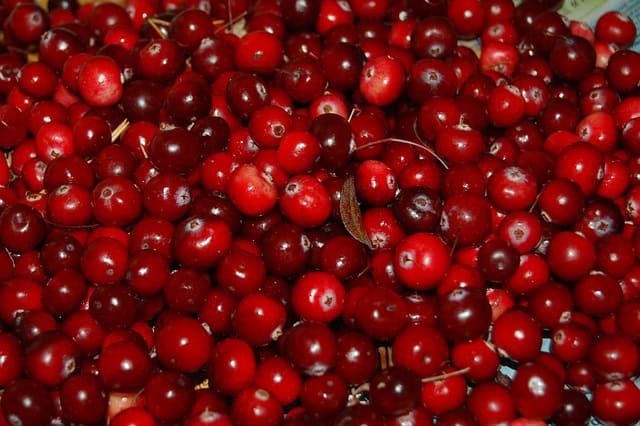-By: Bhavisha Changrani
Cranberries, often associated with holiday meals, are much more than just a tart addition to sauces and drinks. This small, vibrant fruit is packed with essential nutrients and offers a wide range of health benefits. From supporting urinary tract health to enhancing heart function and fighting oxidative stress, cranberries are considered one of the top superfoods for promoting overall well-being. In this detailed article, we will explore the myriad health benefits of cranberries, their active compounds, and how they contribute to a healthier lifestyle.

Urinary Tract Health: A Key Benefit of Cranberries
One of the most well-known health benefits of cranberries is their role in promoting urinary tract health. Cranberries contain a group of compounds known as proanthocyanidins (PACs), which have been shown to prevent harmful bacteria, particularly Escherichia coli (E. coli )bacteria from sticking to the lining of the urinary tract.
This is significant because bacteria that adhere to the urinary tract walls are a primary cause of urinary tract infections (UTIs).
While cranberry products (such as cranberry juice or supplements) have long been touted as a natural remedy for UTIs, scientific research has had mixed results. Some studies suggest that consuming cranberry products can help reduce the frequency of UTIs, particularly in women who experience recurrent infections. However, it’s important to note that cranberries are not a cure for existing UTIs but may serve as a preventive measure or complementary therapy when combined with conventional treatments.

How to Use Cranberries for UTIs:
Cranberry juice: Unsweetened, pure cranberry juice can be consumed to help maintain urinary health.
Cranberry supplements:
Available in capsule or tablet form, cranberry supplements can be an easy way to include this fruit in your diet.
Fresh cranberries:
You can also add fresh cranberries to your meals, smoothies, or salads for a more natural approach.
Rich in Antioxidants: Combatting Oxidative Stress
Cranberries are loaded with antioxidants, which are compounds that help neutralize harmful free radicals in the body. Free radicals are unstable molecules that can cause oxidative stress, contributing to cellular damage, aging, and the development of chronic diseases like heart disease, diabetes, and cancer.
The antioxidants found in cranberries include flavonoids, particularly anthocyanins (the compounds responsible for cranberries’ red color), as well as vitamin C, quercetin, and other polyphenols. These antioxidants play a crucial role in reducing inflammation and protecting the body’s cells from oxidative damage.
Health Benefits of Antioxidants in Cranberries:
Reduction in inflammation:
Chronic inflammation is linked to several health conditions, including arthritis, heart disease, and diabetes. The anti-inflammatory properties of cranberries can help reduce the risk of developing these conditions.
Cell protection:
Antioxidants neutralize free radicals and help protect cells from damage, slowing down the aging process and preventing the development of chronic diseases.

Heart Health: Aiding Cardiovascular Wellness
Cranberries are beneficial for heart health, offering multiple ways to improve cardiovascular function. These heart-healthy benefits are primarily attributed to the fruit’s antioxidant and anti-inflammatory properties, as well as its ability to help reduce certain risk factors for heart disease.
Key Benefits for Heart Health:
Managing cholesterol:
Evidence shows that cranberries may assist in reducing LDL (low-density lipoprotein) cholesterol, which is referred to as “bad” cholesterol.
Blood pressure:
Cranberries may help lower blood pressure by improving blood vessel function. Some studies suggest that consuming cranberry juice or supplements can contribute to better endothelial function, which is essential for maintaining healthy blood pressure levels.
Reduction in oxidative stress:
The antioxidants in cranberries help protect blood vessels from oxidative damage, improving circulation and reducing the risk of cardiovascular events like strokes and heart attacks.
Digestive Health: Aiding Digestion and Gut Function
The fiber content in cranberries is another reason why they are beneficial for digestive health. Fiber helps regulate bowel movements, promote healthy digestion, and prevent constipation. Furthermore, the polyphenols found in cranberries may help support a balanced gut microbiome, which is crucial for optimal digestion.
Benefits for Digestive Health:
Promotes healthy digestion: Fiber helps move food through the digestive tract and supports the growth of healthy gut bacteria.
Supports gut microbiota: Cranberries may help maintain a diverse and healthy microbiome, which has been linked to improved digestion, better immunity, and overall well-being.
Prevention of gastrointestinal issues: Cranberries can aid in preventing gastrointestinal disorders like irritable bowel syndrome (IBS) and constipation, thanks to their high fiber and antioxidant content.
Immune System Boost: Fighting Infections and Illness
Cranberries are rich in vitamin C, a nutrient essential for the immune system. Vitamin C supports the production and function of white blood cells, which help defend the body against infections. Additionally, cranberries’ antioxidant properties help reduce inflammation and oxidative stress, both of which can weaken the immune system.
By consuming cranberries regularly, especially during cold and flu season, you may reduce your risk of getting sick or experience milder symptoms if you do become ill.
Weight Management: Supporting Healthy Metabolism
Maintaining a healthy weight is vital for overall health, and cranberries can play a role in supporting weight management. These fruits are low in calories and high in fiber, which promotes feelings of fullness and helps control appetite. The fiber in cranberries also slows the digestion process, making you feel satisfied for longer periods and potentially reducing overall calorie intake.
Additionally, some studies suggest that cranberries may help regulate fat metabolism, reducing the risk of obesity and related diseases, such as type 2 diabetes. Cranberries may also improve insulin sensitivity, which is crucial for managing blood sugar levels and maintaining a healthy weight.
Cancer Prevention: Potential Anti-Cancer Properties
While more research is needed, some studies have suggested that cranberries may have cancer-fighting properties. The antioxidants in cranberries, especially flavonoids and polyphenols, are believed to play a role in inhibiting the growth and spread of cancer cells. Cranberries have been studied for their potential to prevent or slow the development of certain types of cancer, including breast, colon, and prostate cancer.
Preliminary findings indicate that the compounds in cranberries may help reduce tumor growth, induce cancer cell death, and prevent the spread of cancerous cells, though further clinical trials are necessary to confirm these effects.
Oral Health: Preventing Gum Disease and Cavities
Cranberries may also support good oral health. As mentioned earlier, the proanthocyanidins in cranberries prevent harmful bacteria from adhering to the urinary tract, and this same mechanism works in the mouth. Cranberry compounds can help reduce the adhesion of bacteria that cause plaque formation, gum disease, and cavities.
However, it’s important to consume cranberries in their pure form (fresh, unsweetened juice, or dried cranberries) to avoid the negative effects of added sugars, which can contribute to tooth decay.
How to Incorporate Cranberries into Your Diet
To reap the full benefits of cranberries, it’s important to include them in your daily diet. Here are a few ways to enjoy this superfruit:
Fresh cranberries:
Toss them into smoothies, oatmeal, yogurt, or salads for a burst of flavor.
Cranberry juice:
Opt for 100% pure, unsweetened cranberry juice to avoid added sugars.
Dried cranberries:
Choose dried cranberries without added sugar, and add them to trail mix, baked goods, or granola bars.
Cranberry supplements:
If you prefer a more convenient option, cranberry supplements are available in capsule or tablet form.

Conclusion
Cranberries are not only a delicious, tart fruit but also a powerful superfood that provides a wide array of health benefits. From promoting urinary tract health and supporting heart health to improving digestive function and boosting the immune system, cranberries are an excellent addition to any diet. Whether fresh, dried, or juiced, incorporating this nutrient-rich fruit into your daily routine can help protect your health and improve your overall well-being.













